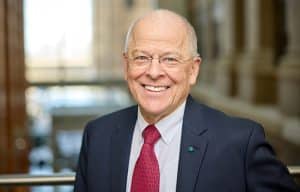Exceptions ARE the rule | Ott Observations
Probably the most famous political debates in American history are the Lincoln-Douglas debates of 1858.
Abraham Lincoln was running for a Senate seat against Stephen Douglas. They agreed to a series of debates in seven of the nine Illinois congressional districts.
They also agreed to a debate format. One person started and spoke for an hour. Then the other person spoke for an hour and a half. Then the first person spoke for 30 minutes in a rebuttal. They took turns going first. CNN and FOX were not there to moderate.
They spoke about the issues of the time, predominantly slavery. They challenged each other with questions. Over 10,000 people attended each debate. There was no seating. Lincoln lost the Senate race but became known in the Republican party for his morally and legally sound argument for the abolition of slavery.
The next most famous political debates are the Kennedy-Nixon debates of 1960. These were the first televised debates. Over 65 million people watched from the comfort of their homes.
Most historians agree this was more a beauty contest than a debate. John Kennedy’s youth, vigor, charisma and sharp suit looked much better that a sweating, somber Richard Nixon in a blah brown suit.
Kennedy won the 1960 presidential election. Although I am an admirer of Kennedy’s legacy, I would also be one of the first to admit Nixon was a more qualified and experienced candidate for the presidency.
Most recently, the optics of the only Trump-Biden debate were so bad Biden ended his bid for re-election. In a brief speech, he explained it succinctly. Although he knew he was mentally competent and believed his accomplishments had earned a second term, he had to acknowledge that the overwhelming perception was that he was too old and feeble to govern.
In our media world, perception is reality.
My own opinion is that this specific perception was not reality. When you get older, it takes longer to search for words. I know this first-hand. In the debate format, you have 2-3 minutes to respond to a question. You have a split second choice. How do I answer the question in two minutes that requires at least 20 minutes to thoroughly answer? Or do I pivot to avoid the question and talk about my accomplishments? Or do I rebut the ridiculous statements and lies my opponent just spewed out?
If you’ve ever tried to have a political discussion in a social setting with mixed views, you can have empathy with Biden’s challenge. I think our eyes lied to us and we’ve eliminated further consideration of a capable leader.
I find it increasingly difficult to argue that there is any real voter educational value in the televised debates we’ve had since 1960. The questions are too narrow, present false issues and are rooted more in what the media moderators want to talk about.
None of the issues we face today, or a precise path to resolve them, can be adequately discussed in two minutes. I find it challenging to adequately write about a single topic in 750 words.
I would suggest that a town hall meeting is a far better venue to learn about how a candidate would lead and specifically how they would tackle a contemporary problem.
Let voters ask questions directly, and give candidates time to thoroughly answer questions. Universities can sponsor and moderate town hall meetings, limiting media to simply broadcast them. People who are disrespectful and won’t politely listen can be told up-front they will be escorted out.
There are politicians that avoid any such direct conversation with voters. They will take a ridiculous stance then refuse to answer for it either directly with voters or to the press that is asking voters’ questions.
U.S. Rep. Ann Wagner in Missouri is a perfect example, relying on party affiliation for re-election vs. any direct explanation for her positions or ideas.
Imagine 10,000-plus people traveling by foot, horse, wagon or train to stand outside for three hours and listen to two candidates talk about who they are, what they stand for and how they will implement policies. However informed we truly want to be, I’m not sure any of us would do this today.
The best we can hope for is to sit on our sofa and listen to one candidate talk for two hours in response to questions voters are asking directly.






